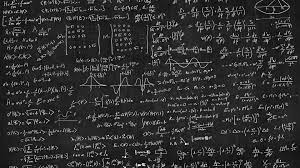My Journey to Maths, and why I Decided to Stay.

For as long back as I can remember, I’ve always hated maths. Numbers, especially, were never really my thing. In fact, they still aren’t (I still need my fingers to perform simple addition). My grandmother was a maths teacher, and it was largely through her efforts that I managed to do well in school. I remember her telling me that maths could be pretty fun if I would just try to change my perspective. She even told me, to my utter disbelief, about many of her former students who were “addicted” to maths (my simple mind could not yet conceive of such mental disorders). However, it was not my grandmother who sparked my interest in maths, and it was certainly not my school (which almost succeeded in completely killing it). Rather, I was introduced to maths through physics. In the 8th grade, I read this awesome book called The Universe in your Hand, written by Christophe Galfard. It was this book that started my almost 4-year love affair with physics. Initially, my interest in physics was very childish. Just the simple curiosity of a boy newly awakened to the magical world of black holes and subatomic particles that simultaneously exist everywhere. Things only took a serious turn when I realised that physics, at even the most basic level, requires some very sophisticated mathematics. It was then that I decided to leave (temporarily?) that magical world of higher physics and immerse myself in the mechanical billiard ball world of Newtonian mechanics. As a result, I started to study mathematics on my own in the 9th grade. Much to my surprise, I actually started to like maths for its own sake. I mean, who ever knew that it actually made sense? Thinking back, I probably always liked maths. I just didn’t like the way I was taught maths. No one ever really taught me maths with just that pure intention of helping me understand something truly beautiful. It was always mainly to enable me to solve problems for an examination. This had the adverse effect of disguising simple and perfectly logical ideas as arcane and seemingly arbitrary rules. To take a very simple example: every child is taught that when you “take something to the other side of the equal sign plus becomes minus and multiplication becomes division.” But why? This is exactly what I asked my brother, in the 8th grade. To my surprise, he said he didn’t know why. Simply put, he didn’t need to know why. Just knowing that simple rule was all he ever needed to solve any algebraic equation shoved in front of him, and hence, no one even bothered mentioning the reason. The situation is far worse in the higher grades. It was always an uphill battle, desperately trying to stay interested in maths. I even know of a comrade (God rest his soul) who lost this very battle. I only managed to survive by always staying one step ahead of them. I never went to a math class where I hadn’t thoroughly studied the topic on my own beforehand (so as to not spoil its proper enjoyment). And I always managed to do well in the exams and answer the tough questions in class, and so the teachers more or less just left me alone. Anyway, I could just go on venting about the education system, but I’m afraid we’d run out of space. Suffice it to say, my interest in maths is going strong for now. I’d like to think that over the years I’ve become wiser. If not better, at mathematics. As cliché as it sounds, it’s all about asking the right questions. For example, I never really understood, in my gut, what linear algebra was all about the first time I encountered it. I would always ask questions like: but what really is a vector? Is it an arrow? Why is the sum of two vectors the diagonal of the parallelogram formed by them? Why not something else? Learning abstract algebra truly opened my eyes to the folly of such questions and gave me my first real taste of mathematical thinking. A vector is not really an arrow or even a list of numbers. To understand it, we have to understand something far more abstract: the notion of a vector field. Put simply, a vector field consists of a collection of objects called vectors and certain ways to combine them to obtain other vectors. The specifics of these objects and operations are left completely undefined, but whatever they are, they are required to follow certain rules (or axioms), and as long as they do, we can call these objects vectors. The why of these rules is not the mathematician’s concern. They are simply there because they are useful in various situations. The key insight here is that these axioms aren’t written somewhere in the stars. Mathematicians simply assume them to be true and are mainly interested in their consequences. It’s almost like having your own universe and your own set of fundamental laws, with the whole of creation exploding forth from them with the undeniable force of cold hard logic. The sheer simplicity and elegance of this kind of thinking absolutely captivated me. It is this axiomatic structure of modern mathematics that has me completely hooked to it, and it is the reason I left physics. I mean, why bother with the real universe in all its approximations and uncertainties when you can create your own? One that is unimaginably intricate and beautiful, like a rare diamond suspended in a state of timeless perfection. This is why I like maths. And even though I’m not particularly clever or even good at it, I still feel most comfortable in it. It is the only certain thing in life.